THE NBA ISN'T A GUARD DRIVEN LEAGUE
Who really wins games when it actually matters?
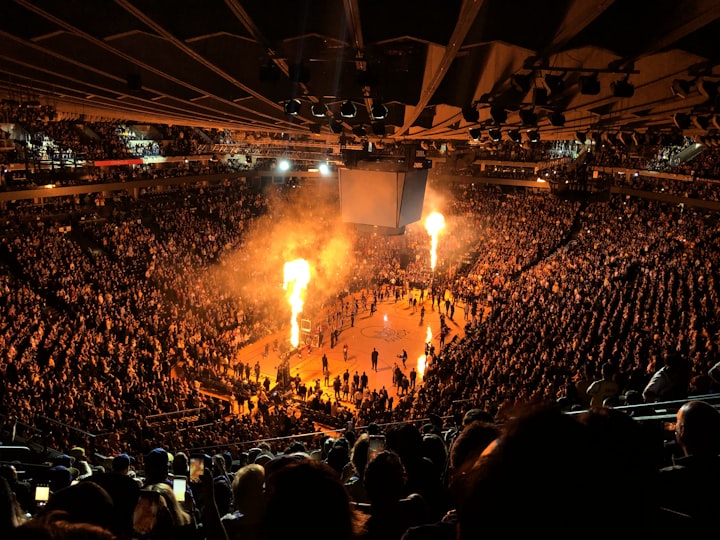
My mother’s favorite solution on those hot summer days was to get an ice cream cone. Overcome with the excitement of escaping the heat and humidity into the comforting chill of the air-conditioned room. Same goes for the ice cream trucks that gave you a burst of cold air while you waited in their shadow. Even today, there’s magic in the air while watching someone prepare an ice cream cone for you. The anticipation is rewarded from the moment it touched your hands. You missed this… and you can’t believe you lasted this long without it.
I feel the same way about the NBA.

A comforting ice cream cone that you just can’t wait to get your hands on. Can’t wait to see the lead up to every season and the hard work that goes into it. Summer league, training camp, preseason, and finally the regular season tip off. Just like an ice cream cone, the NBA has an exciting start.
However, the middle is mostly a clumsy chore to complete.
A melting mess we really don’t get to enjoy it again until we get down to the very end of the cone. That’s when it all makes sense again. The last bit before it’s all over, where we really savor the flavors the same as we did when we first got the cone.
If I’ve made you crave an ice cream cone, my condolences to your diet, but hey, treat yo self!
If we can accept that the NBA is indeed like an ice cream cone, then we know that the regular season is the sloppy, messy, and the boring part. Make no lasting impression on you because we’re too busy trying to figure what this sticky mess. We end up rushing through it with reckless abandon, just waiting for the end when the goop settles. Most people call that the NBA Playoffs. Don’t just take my word for it, let’s parlay our poetics and do a deep dive on the NBA Regular Season by comparing the Regular Season MVPs and the Post Season MVPs.
Is the NBA truly a Guard driven league?
The query that launched my deep dive into the data. For years, we’ve heard about the guards driving the league. It was the most important position to have. All Star caliber guards put in front of us like the goose that would lay the golden eggs. However, when the finals ended every year, it would seem that a Forward would get the finals MVP. That their contributions lasted the longest and had the most impact.
My Initial Hypothesis
As a strength and conditioning professional, my personal take on this has always been that guards and centers are highly limited in the postseason. From a physical standpoint, the regular season and the NBA Playoffs have much different intensities. Guards and Centers simply can’t sustain the high-intensity effort if they are the focal points of the team. Easy to beat up and double. Easy to punish physically such that even when they get a bucket through contact, the contact will do its damage. They inevitably get hurt and have to slow down. If they are the focal point of the team, that means the team slows down.
Which is why Forwards are the position best suited for the games that count. Unlike guards and centers, forwards range of size and athleticism allows them to do a bit of everything on the court. Including make key defensive plays and switches. Make a block and finish in transition. Take advantage of mismatches all over the court. Fast enough to beat a bigger big, stronger than the smaller guards, fast enough to attack the hole in the defense and skilled enough to finish.
Where’s the Proof?
Well, let’s look at the Regular Season MVPs and the Finals MVPs since 2000.
REGULAR SEASON RESULTS
In examining the regular season, I discovered that 14/22 (63%) didn’t make the finals and 17/22 (77%) did not win a championship the same year they won MVP.
In this time period, only Shaq, Tim Duncan, and LeBron (2x) won MVP and Finals MVP in the same year. The only MVP that won a final in that span but didn’t win Finals MVP was a guard. (Curry)
9 guards won MVP in this period (40.9%). Since 08’ guards have won the award 6 times (37.5%)
REGULAR SEASON CONCLUSIONS/FACTS
• 14/22 NOT IN FINALS • 9/22 (40.9%) DEFINITIVE GUARDS •
• 17/22 DIDN'T WIN CHAMPIONSHIP •
• SINCE TURN IN 08 - GUARDS 6/16 (37.5%) •
• SHAQ/DUNCAN/LEBRON WON MVP AND FINALS •
• 15 PLAYERS WON MVP IN THIS SPAN. 5 WON > 2x (12/22)
• LEBRON ONLY PLAYER TO REPEAT FEAT MVP/FINALS MVP
• 4/22 WON MVP AND FINALS MVP
• ONLY MVP THAT WON FINALS AND WASN'T MVP- GUARD (CURRY)
• 15/22 OF FINALS MVPS WON 1(+) MVP
However, in this period, 15/22 (68%) of Finals MVP had won at least one MVP as well. Which coincides with the number of individual players that won the MVP award in total.
FINALS MVP CONCLUSIONS/FACTS
• 3 GUARDS HAVE WON FINALS MVP (3/22)
• 13/22 LEAD TEAM IN REBOUNDS
• FORWARDS HAVE WON 14 YEARS RUNNING
• 13/22 LEAD OR TOP 3 IN ASSISTS
• IF WE TOOK 03-08 GUARDS HAD A RUN
• 14/22 LEAD OR TOP 3 IN BLKS/STLS
• FORWARDS AND CENTERS WENT 19/22
• 14/22 LEAD TEAM IN 3+ STATS
• 17 YEARS SINCE A CENTER WON FINALS MVP
• DUNCAN/LEBRON/GIANNIS LED IN 4(+) CATEGORIES
POST SEASON RESULTS:
- 3 Guards have won Finals MVP (13.6%). The only viable argument for Guards having the most impact on a team for a title would be from 03 to 08.
- Forwards have won the Finals MVP for 14 years in a row. If we add non-guards into the mix, Centers and Forwards won Finals MVP (86%) of the time.
- Nearly 60% of the Time, the Finals MVP Lead their team in Points AND Rebounds. The same holds true for leading in Points and Assist. *If we include finishing in the top 3 on your team.
- 63% of the time, the Finals MVP lead their team in at least 3 statistical categories and lead the team in Blocks/Steals. *If we include finishing top 3.
Only Tim Duncan, LeBron James, and Giannis lead their team in 4(+) stats in this period.
It’s been 17 years since a “Center” won Finals MVP.
I’m not saying that guards aren’t valuable. In fact, a stable guard can be crucial to winning an championship. However, they are not the X factor in the series. It takes too much on their body to handle every duty on the court. They have to run the offense, facilitate, score, defend, defend in transition, box out, outlet, and run the fast break. If you’re watching the Phoenix series right now, you can look at the labor that Chris Paul has endured without Devin Booker. Both players dealt with injuries at the end of the postseason last year as well.
Guards can take you to the front door. Curry, Klay, Lillard, McCullom, Murray, Harden, CP3, Booker, Beal, Wall. These are All-Star guards that have carried the load and end up breaking down without the Forwards/Freak Bigs to handle the load.
It’s not that they can’t get you there. They just don’t have the energy to open the door by the time they get there.
Unlike centers, who struggle to even get into the right neighborhoods despite their regular season greatness. That’s a breakdown for another day. For now, let’s go over the data sets from the last 22 seasons.
THE BREAKDOWN
Let’s go over these segments in time. I broke them down:
WHEN BIGS WERE DOMINATE (2000 – 2005)
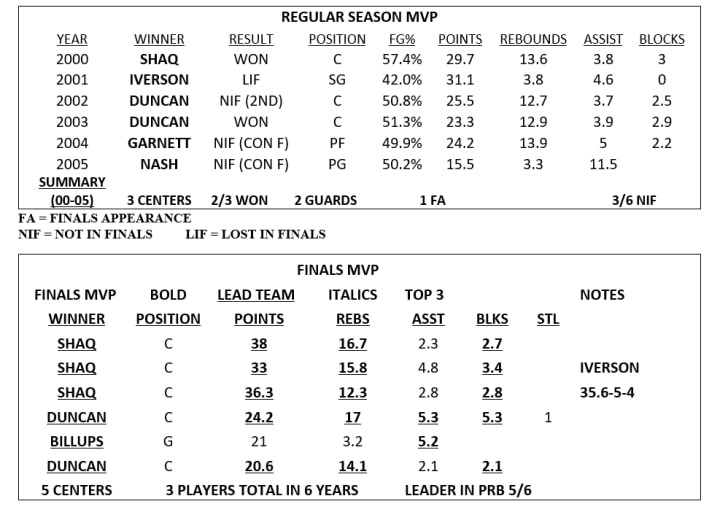
THE TRANSITION (2006 – 2010)
This period allows us to argue a bit. That is because Kobe and Pierce are listed as G/F sometimes and are considered being Guards. This gets into the crux of the argument. Those same people most likely didn’t blink an eye when I neglected to list Tim Duncan as a PF rather than a center. Which would help my argument by doing so. Instead, I listed them based on the reference sites. It is not based on my opinion. Which, for my next point during the next period, makes no difference to the dominance of forwards.
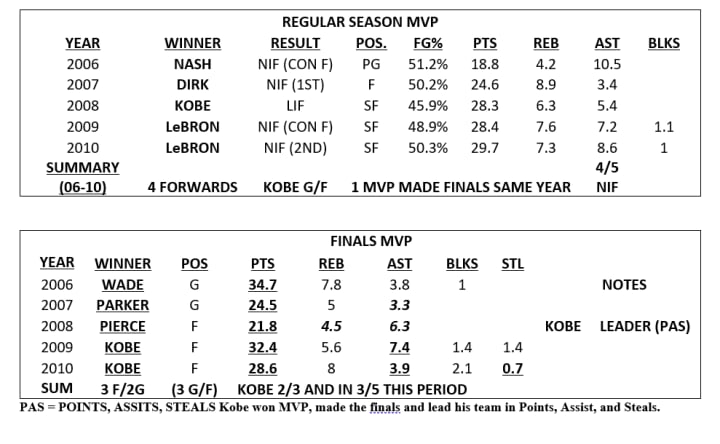
We’ve had the self-explanatory Dominance of Bigs Era and now the Transition. But a transition into what?
FORWARD VERSATILITY (2011-2015)
This era is marked by the dominance of Forwards in the Finals. In fact, it is the only occurrence since 2000 that the Regular Season MVP won the championship but was not named the Finals MVP. Which went to a versatile Forward in Iguodala who changed the course of that series on both sides of the floor. Versatility meant these players who adjust and adapt, shape, or form needed in ways that no other position could.
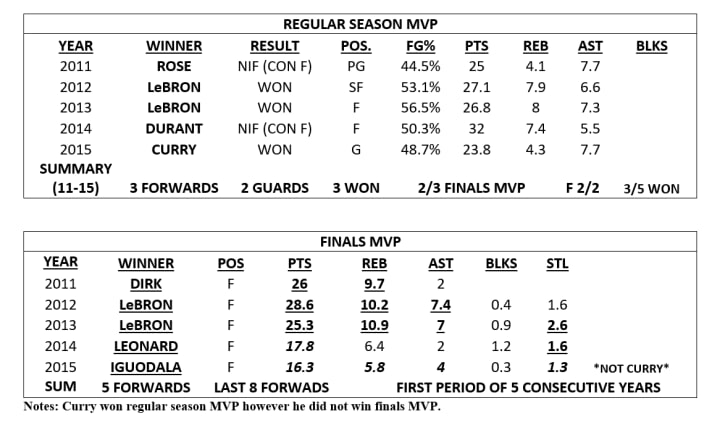
Curry won regular season MVP however he did not win finals MVP.
THE ERA OF FREAKY FORWARDS (2016-2021)
This era is of the Freaks. The people who can do everything you could need them to do on the court. Not only filled with current and former MVPs, we see these Finals MVPs winning on new teams. We see the emergence of the next generation of impactful players before our eyes. We will see how two players in this period would win Finals MVP and make up 66.6%. If we extend this period back to 2014, 75% (6/8) Finals MVPs would be freakishly versatile forwards who would lead their teams in 3(+) Statistical categories and 3 in this period were at the top of every statistical category for their team (LeBron/Leonard/Giannis).
*Durant averaging 7.5 assists would mean 4 category leaders or top 3 on the team.
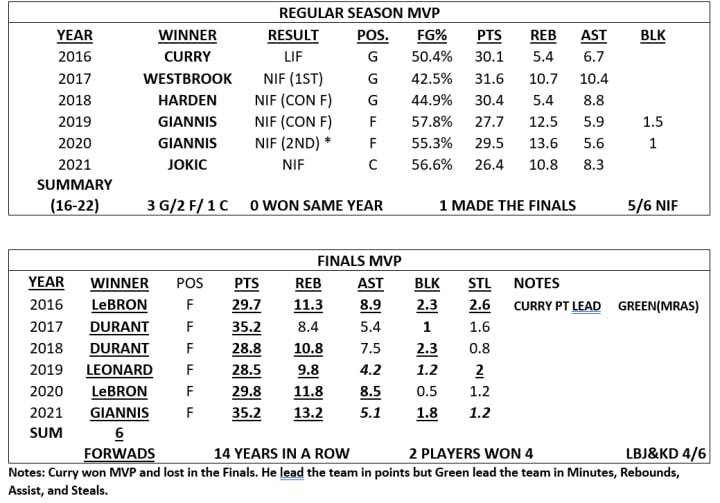
Curry won MVP and lost in the Finals. He lead the team in points but Green lead the team in Minutes, Rebounds, Assist, and Steals.
FINDING MEANING
Like my childhood summers, those moments of serenity found in the scorched heat of the summer sun, the humidity rising to its peak. The ice cream store was a haven. Every piece that goes into that store from the ground up has a role and is important. I’d say that while the ice cream may be the star of the show, we connect more with the employee. The person scooping the ice cream.
Why?
Just like an NBA guard, the person scooping the ice cream is someone we can relate to. That’s something that we believe we can do without. Within our realm of reasonable expectations. Even if we don’t truly understand the labor involved. That’s how we few the guards in the league. They aren’t the 6’8” or taller physical specimens. They’re 6’3” and under. We actually know someone that size. We may be 5’11” like Fred VanVleet or have a friend that could look eye to eye.
These people are just as spectacular as their taller counterparts. There is quite a gap between our perception and this reality. Yet, it is in that gap that grew the mistaken premise. The NBA is a guard driven league. I admit, when we are discussing the appeal and the sales pitch during the regular season, I can understand that. However, the wealth of data clarifies that not much has changed in the NBA.
FINAL THOUGHTS
In order to be an NBA Champion, a team needs a versatile Forward. Earlier this year, I mentioned my love for Boston and their makeup. The first half of the year I looked like an idiot, I’ll admit. But now, they too feed into this narrative. This means that for the Suns to win a championship, it’s not CP3, Booker, or even Ayton, it’s Bridges.
As we watch the best Centers in the league struggle to make it out of the first round and the best guards wear down, it’s quite clear. Over the last 14 years, Forwards are the X Factor. Until that changes, the NBA is a Forward Driven league.
All Stats and Info can be found here!
About the Creator
Blake A Swan
NCSA Strength and Conditioning Professional certified as a CSCS, TSAC-F, and CPT. I have my FMS Certification as well, and spent over a decade working with athletes in various sports. Including youth, high school, college, Olympic and Pro.
Enjoyed the story? Support the Creator.
Subscribe for free to receive all their stories in your feed. You could also pledge your support or give them a one-off tip, letting them know you appreciate their work.






Comments
There are no comments for this story
Be the first to respond and start the conversation.